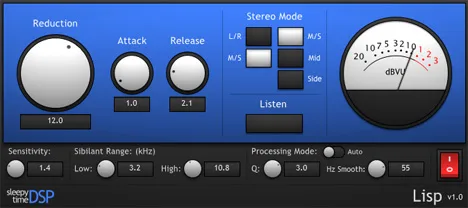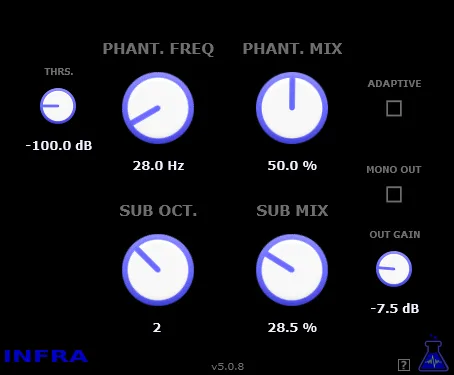Lisp: Your Intelligent Assistant in the Fight Against Sibilants
Vocals are a central element of most musical compositions, and their clarity and intelligibility are crucial for the listener’s overall perception of the track. However, vocal recording often presents the problem of excessive sibilance – harsh, hissing sounds like “s,” “z,” “sh,” “zh,” “ch.” These sounds, if left unchecked, can become very unpleasant, fatigue the listener, and even cause distortion at certain stages of music production.
Traditionally, sound engineers use various methods to tame sibilants: standard de-essers that operate based on threshold values and frequency filters; dynamic equalizers; or even painstaking manual audio editing. Each of these approaches has its drawbacks – standard de-essers can sound unnatural and suppress not only sibilants, but also desirable high frequencies; dynamic equalizers require precise adjustment of frequencies and thresholds; and manual editing is an extremely time-consuming process, especially for long vocal parts.
Why Does Lisp Stand Out?
Sleepy-Time DSP offers a fresh, innovative approach to solving the sibilance problem with its Lisp (Level-Independent Sibilance Processor) plugin. As the name suggests, the key difference of Lisp lies in its “level-independent” operation. Unlike most de-essers that only react when a sibilant exceeds a set loudness threshold, Lisp analyzes the signal quite differently.
The plugin uses a complex algorithm for automatic sibilant detection, specifically tuned to the human voice range. This algorithm tracks not only the amplitude, but also the pitch of the input signal in real time. Lisp is based on a modified version of the transient detection algorithm from Sleepy-Time DSP, complemented by fast frequency analysis and phase compensation methods to remove unwanted sibilant components. This combination allows Lisp to identify and effectively reduce sibilants regardless of the overall vocal loudness level or performance dynamics. This means that the plugin will work consistently, even if the singer changes the distance to the microphone or the dynamics of their voice during the track.
Key Features and Benefits:
- Innovative Detection Algorithm: Uses a unique combination of amplitude, pitch analysis, and transient detection to accurately identify sibilants without relying on fixed thresholds or frequency bands.
- Signal Level Independence: Provides stable and effective sibilant suppression, adapting to the dynamics of vocal performance. This makes it ideal for tracks with significant volume changes.
- Natural and Musical Sound: Due to the use of phase compensation and the absence of harsh compression, Lisp reduces sibilants while preserving the natural tonality and “air” of the vocals. The result sounds clean, smooth, and professional, avoiding “artificial” artifacts.
- Ease of Setup: The plugin’s interface is simplified as much as possible. You only need to set the desired level of sibilant reduction, and Lisp will do everything else automatically. This saves you time and effort.
- High CPU Performance: Designed with efficiency in mind, Lisp consumes minimal processor resources, allowing it to be used on many tracks in your project without significantly straining the system.
- Targeted and Intelligent Action: The plugin effectively processes not only the classic “ss” sounds, but also more complex sounds containing sibilant components (“te,” “ch”), ensuring the clarity of the entire vocal performance.
Lisp from Sleepy-Time DSP is a powerful and intelligent tool that changes the approach to de-essing. It offers a quick, efficient, and, most importantly, musical solution to one of the most common vocal processing problems. Forget about hours of monotonous setup and editing. With Lisp, you can get clean, professionally sounding vocals in seconds. This is an indispensable plugin for any musician, producer, or sound engineer who strives for perfection in vocal processing. Try Lisp and feel the difference that a truly intelligent sibilance processor can make.



